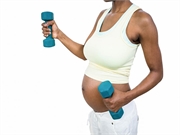- Could Your Grocery Store Meat Be Causing Recurring UTIs?
- Are You Making This Expensive Thermostat Error This Winter?
- Recognizing the Signs of Hypothyroidism
- 10 Strategies to Overcome Insomnia
- Could Artificial Sweeteners Be Aging the Brain Faster?
- Techniques for Soothing Your Nervous System
- Does the Water in Your House Smell Funny? Here’s Why
- Can a Daily Dose of Apple Cider Vinegar Actually Aid Weight Loss?
- 6 Health Beverages That Can Actually Spike Your Blood Sugar
- Treatment Options for Social Anxiety Disorder
Pandemic Affecting Mental Health of Pregnant Women, New Moms

The coronavirus pandemic is adding to the mood issues that many pregnant women and new moms experience, according to a new study.
One in 7 women experience anxiety or depression immediately before or after giving birth — and researchers say the pandemic has made it even worse.
“The social and physical isolation measures that are critically needed to reduce the spread of the virus are taking a toll on the physical and mental health of many of us,” said study co-author Margie Davenport, an associate professor of kinesiology, sport and recreation at the University of Alberta in Edmonton, Canada.
The study included 900 women — 520 who were pregnant and 380 who’d given birth in the past year. They were asked about their depression and anxiety before and during the pandemic and its accompanying isolation.
Before the pandemic, 29% had moderate to high anxiety and 15% reported symptoms of depression. During the pandemic, those rates increased to 72% and 41%, respectively.
The women were also asked about their exercise habits. Researchers wanted to know if lack of access to gyms during the pandemic and reduced physical activity were taking a toll, because exercise can help ease depression.
Sixty-four percent of women said they were getting less physical activity now, while 15% were doing more and 21% had no change in activity. Women who were getting at least 150 minutes of moderate physical activity each week had significantly lower symptoms of depression and anxiety, the study found.
The findings were recently published in the journal Frontiers in Global Women’s Health.
“We know that experiencing depression and anxiety during pregnancy and the postpartum period can have detrimental effects on the mental and physical health of both mother and baby that can persist for years,” Davenport said in a journal news release.
Those effects can include premature delivery, reduced mother-infant bonding and developmental delays in infants.
Davenport said it is important to highlight the impact of isolation on the mental health of pregnant women and new moms because increased awareness makes diagnosis and treatment of anxiety and depression more likely.
More information
The American Pregnancy Association has more on depression during pregnancy.
Source: HealthDay
Copyright © 2026 HealthDay. All rights reserved.










